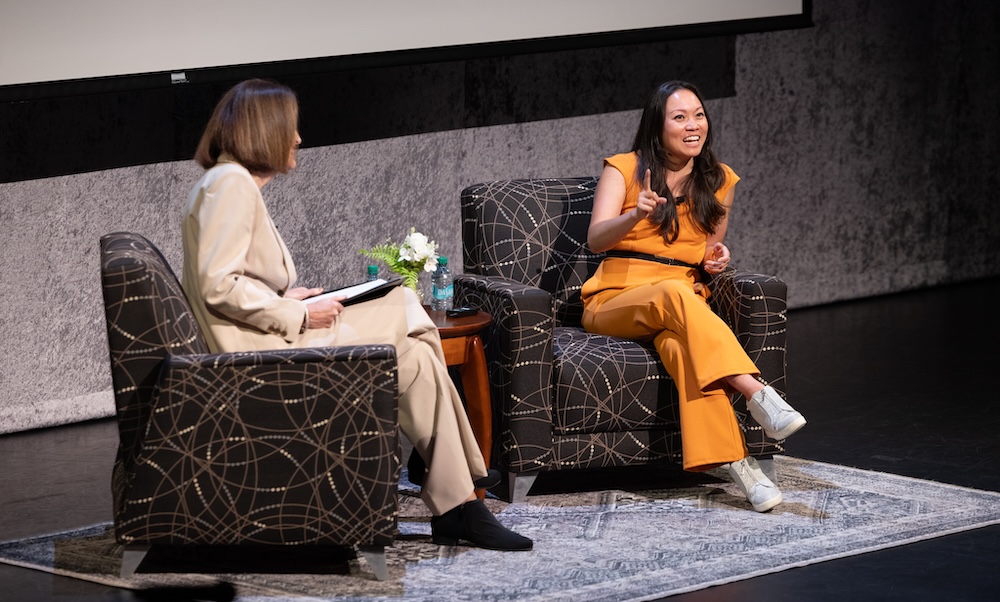

KENNESAW, Ga. | Sep 8, 2025

Pham, the vice president of artificial intelligence at Workday and a public policy lecturer in the Harvard Kennedy School of Government, discussed “AI Across Boundaries: The Only Way Forward.” Speaking to a packed theater at the Joe Mack Wilson Student Center on KSU’s Marietta Campus, Pham touched on the past, present, and future of AI.
Pham explained that the AI ecosystem – a combination of industry, academia, government, venture, and advocacy – needs to strengthen their connections amongst each other to advance AI technology, policy, education, and innovation.
“We all have a role in the AI ecosystem,” Pham said. “A lot of conversations are happening now across those sectors about what should engineers build. How should we build it? What kinds of guardrails should we want in place? This takes many different sectors to figure out.”
Pham served as the inaugural speaker in the Presidential Lecture Series, which aims to amplify the voice of thought leaders, address timely and consequential topics that shape society, challenge prevailing viewpoints, and foster civil discourse. Aligned with KSU’s strategic plan, the series enhances the university’s commitment to academic excellence, public impact, and lifelong learning.
“Our goal is to elevate issues of the day and to hear from experts who are pushing the boundaries on technologies, policies, and innovations that impact how we learn, work, and live our lives,” KSU President Kathy S. Schwaig said. “Kathy Pham was the perfect choice as our inaugural speaker. Her vast expertise and impactful voice offered critical insights as artificial intelligence continues to transform nearly every aspect of our personal and professional lives.”
As part of her talk, Pham sat down with Schwaig for a “fireside chat.” One of the questions Schwaig asked was how the next generation of developers – such as current KSU students – should approach building AI practically and responsibly in the future. Pham’s answer is to bring a variety of scholars and practitioners to the table, offering a breadth of viewpoints and expertise.
“You need to bring your life experiences and your expertise to the room, but leave your title at the door,” Pham said. “Building ethical and effective AI requires input beyond technologists. You need historians, lawyers, social scientists, and others who all add essential perspectives and see any blind spots that we’re missing.”
A common concern about AI is that people could overrely on a technological tool that provides output without having an element of humanness. Pham stated that developers can – and should – build empathy and inclusivity into AI systems.
“I think we definitely can design to be more inclusive,” Pham said. “It just requires deciding that you want to do it, asking lots of questions, and then finding all the resources.”
She added, “Being empathetic is a deeply human feeling, and you can’t replace having another person right across from you. However, I think that AI platforms can be trained on enough systems to offer a semblance of empathy – for example, drawing from a vast repository of responses if somebody says, ‘I’m feeling down today.’”
Pham credited KSU for its commitment to addressing the increasing demand for professionals
with AI expertise.
“I am inspired by what you’re doing with AI here at Kennesaw State,” she said.
Last year, KSU began a Master of Science in Artificial Intelligence degree program, only the second of its kind in Georgia. This fall, Kennesaw State added two AI graduate-level certificate programs – in artificial intelligence and writing technologies, and in AI and cloud technology.
In addition, several Kennesaw State professors are using AI technology in their research endeavors. Among the many meaningful AI-related projects, KSU researchers are developing a device for diabetics to check their blood sugar without having to prick themselves; using a monitoring system to check water quality in real time; creating automations to protect peanut fields and strawberry fields from pests; creating a smartphone-based imaging system to help detect diabetic retinopathy earlier and more affordably; and developing software that could help first responders better handle emergency calls for mental health issues.
– Story by Paul Floeckher
Photos by Matt Yung
A leader in innovative teaching and learning, Kennesaw State University offers undergraduate, graduate, and doctoral degrees to its more than 51,000 students. Kennesaw State is a member of the University System of Georgia with 11 academic colleges. The university's vibrant campus culture, diverse population, strong global ties, and entrepreneurial spirit draw students from throughout the country and the world. Kennesaw State is a Carnegie-designated doctoral research institution (R2), placing it among an elite group of only 8 percent of U.S. colleges and universities with an R1 or R2 status. For more information, visit kennesaw.edu.